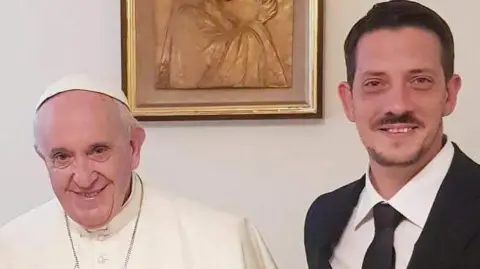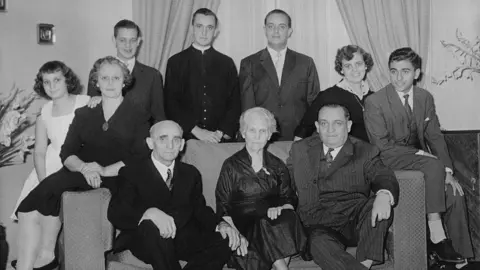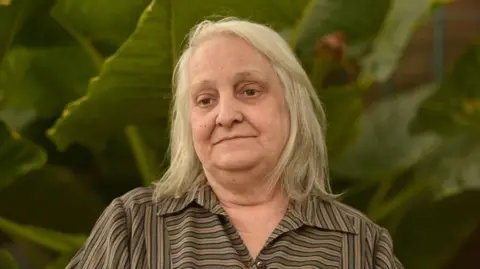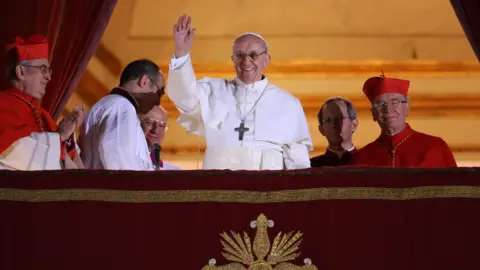Pope Francis' nephew remembers father figure 'Uncle Jorge'
 José Ignacio Bergoglio
José Ignacio BergoglioTo his family, Pope Francis was simply "Jorge Mario" - even during the 12 years that he was pontiff.
"When Jorge decided to accept the papacy, he understood his life as he knew it would change forever, and so did we," the Pope's nephew, José Ignacio Bergoglio, told BBC News Mundo.
"When we heard of his passing, it came with a certain comfort to the soul, because we knew our loved one was finally at peace, and once again, he was simply our Uncle Jorge."
Before he became the first Latin American to lead the Catholic Church, Pope Francis was Jorge Mario Bergoglio, born into a close-knit, middle-class household in the Argentine capital, Buenos Aires.
 Getty Images
Getty ImagesThe eldest of five siblings, he often described their bond as being "as close as the fingers of one hand."
Among them, he shared a particularly special connection with his younger sister, María Elena – now the only surviving member of his immediate family.
 Getty Images
Getty ImagesFather figure
Pope Francis also played a pivotal role in the life of his nephew, María Elena's son José Ignacio, who grew up without a father.
"I always say that my two uncles, Alberto and Jorge, became the father figures I so deeply missed as a child," José Ignacio said.
"Jorge knew how to be serious when needed, but he never lost his spontaneity or his sense of humour. He was a warm, approachable uncle, and I loved him deeply."
José Ignacio vividly remembers the day his uncle was elected pope, a moment that stunned him, especially after he had dismissed all speculation that Jorge could ascend to the papacy.
"I had gone to a family friend's house for a meal, and we began watching the conclave. The moment the white smoke rose, I started to tremble. I became incredibly nervous," he said.
- You can watch and follow the funeral live here on the BBC News website and app. In the UK, there will be live coverage on BBC One from 0830-1230 BST, presented by Reeta Chakrabarti, available to watch on the iPlayer. There will also be live coverage on the BBC News channel presented by Maryam Moshiri. Finally, you can also follow coverage of the funeral on the BBC World Service
"Then, the protodeacon stepped out and announced, 'Habemus Papam.' I only heard 'Giorgio Mario.' I dropped to my knees in front of the television and started to cry."
The short journey to share the news with his mother, who lived just 15 blocks away, took much longer than usual. Everywhere he went, locals stopped him to offer their congratulations.
"At home, I hugged my mother, and we cried together for a while. Then cousins and friends started to arrive, and the phone was ringing off the hook."
Amid the chaos, with local and international media camped outside their door, the phone rang again around 9pm. A distant voice on the other end simply said, 'Hello.'
"Who am I speaking to," I asked. "It's Jorge, boludo," came the reply [using the rude slang Argentines use for "idiot", often affectionately].
"It was Pope Francis, swearing," José Ignacio recalled. "I handed the phone to mum. As they spoke, I watched her tears dry. It was an incredibly moving moment."
Powerful message
 Getty Images
Getty ImagesHundreds of thousands are expected to gather in St. Peter's Square on Saturday for Pope Francis's funeral, including world leaders, Catholic officials, and mourners from around the globe.
However, José Ignacio said his family had no plans to travel to Rome for the service.
"We firmly believe our place is here," he explained, encouraging mourners to honour Pope Francis's memory by donating to charity, a gesture he believed would be a more meaningful tribute.
José Ignacio had shared the news of his wife's pregnancy with the Pope during their last conversation, a moment that would remain etched in his memory forever.
"The joy and emotion he expressed were deeply meaningful to me," he said, adding that Pope Francis left him with a powerful message to live a life of solidarity, austerity, humility and commitment.
He also remembered a conversation from his teenage years when his uncle was a cardinal, recalling it as the best advice he ever received on how to make the world a better place.
"Change comes from within, through commitment," his uncle had told him.
"If you're unhappy with the police, become a policeman and change it from within. If you're dissatisfied with politics, get involved in politics. With commitment and conviction, we can create a better world,' he said.
"I think this is one of the most profound lessons I've learned from him."
